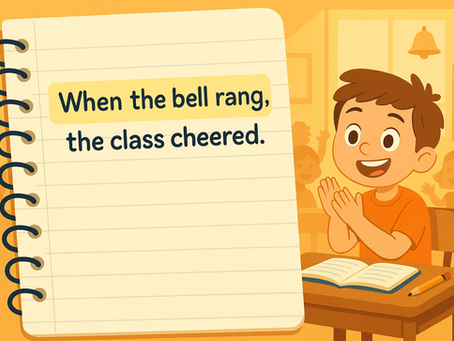top of page
All Posts


Subjunctive Mood Made Simple
The subjunctive may sound scary, but it’s simply the form we use for wishes, hypotheticals and formal suggestions—think “If I were…”, “We suggest that he be…”, and “Long live the King.” In this clear KS2 guide, you’ll learn what the subjunctive is, how to spot it quickly, and when to use it in writing. Includes a 10-minute mini-lesson, age-appropriate activities, common pitfalls, and a printable worksheet with answers—so you can help your child feel confident before SATs.

Admin
Oct 34 min read


Relative Clauses Made Simple
Relative clauses — mini-sentences starting with "who, which, that" and more — add extra detail to a noun: “The girl 'who won the race' is my sister.” This Year 5 parent guide untangles the difference between relative and other subordinate clauses, gives a handy pronoun cheat-sheet, and shares quick “underline-the-clause” games to boost your child’s grammar skills before homework or SATs.

Admin
Aug 13 min read


Determiners Made Simple
A determiner is the small word that comes before a noun—a, the, my, two, those—telling us which one, whose, or how many. This parent-friendly guide lists every determiner type, shows the difference between determiners and adjectives, and offers easy games so children can spot and use them with confidence.

Admin
Jul 123 min read


Active and Passive Voices Made Simple
Active voice puts the doer first—“The dog chased the ball.” Passive voice moves the receiver to the front—“The ball was chased by the dog.” This Year 6 parent guide shows how to spot passive constructions, flip sentences step-by-step, and understand why writers sometimes choose the passive for science reports, unknown agents or polite diplomacy. Quick games, exam-style tips and common pitfalls help your child master both voices before SATs.

Admin
Jul 63 min read


Modal Verbs Made Simple
Modal verbs—can, could, may, might, must, and more—let writers show possibility, permission, or obligation. This parent-friendly guide lists every Year 5 modal verb, explains when to use each one, and shares fun activities (like a “certainty thermometer”) to help children master them.

Admin
Jun 303 min read


Expanded Noun Phrases Made Simple
Expanded noun phrases turn plain nouns into vivid pictures—“the fish” becomes “the shimmering, silver fish in the deep pond.” This parent-friendly guide explains the concept in simple terms, offers easy ways to build expanded noun phrases with adjectives and prepositional phrases, and includes quick games so children in Years 4–5 can practise adding detail and colour to their writing.

Admin
Jun 223 min read


Subordinate Clauses Made Simple
Main clauses can stand alone, but subordinate clauses can’t—they’re “helper ideas” that begin with words like *because, although,* or *when* and rely on a main clause to finish the thought. This parent-friendly guide explains the difference in plain English, shows how to spot common subordinating conjunctions, and offers easy activities to help children master complex sentences with confidence.

Admin
Jun 173 min read


English Fun’s 11+ Style Daily Creative Writing Challenges
Jump-start your child’s storytelling with English Fun’s daily Creative Writing challenges! Every morning a fresh prompt sparks imagination, and an AI marker returns instant, teacher-style feedback—scoring ideas, structure, vocabulary, style, and GPS on a 1-5 scale and highlighting specific strengths and next steps. It’s the easiest way to turn writing practice into a fun, confidence-boosting habit.

Admin
Jun 83 min read


Fronted Adverbials Made Simple
Fronted adverbials might sound like advanced grammar jargon, but they’re simply time-, place-, or manner-phrases moved to the start of a sentence - “Before sunrise, the birds began to sing.” This parent-friendly guide demystifies the term, explains why schools teach it, and shares quick at-home activities to help children practise. For interactive exercises and a child-ready explanation, head to EnglishFun.co.uk’s dedicated page on fronted adverbials.

Admin
Jun 12 min read


Tiny Tasks, Big Pay‑Off: How a Few Minutes of Daily Reading & Writing Build Lifelong Habits— and Better Exam Results
A few minutes of reading and writing each day may not seem like much, but over time, these small habits build powerful skills that help children succeed—especially in exams.

Admin
May 22 min read


Why Children Who Read More Tend to Excel in Exams
Reading isn’t just a pastime—it’s a powerful tool that boosts vocabulary, refines critical thinking, and nurtures a lifelong learning.

Admin
Mar 213 min read


Transforming English Learning for Your Child
Discover a fresh, interactive approach to English learning for UK children aged 7 to 11.

Admin
Feb 83 min read
bottom of page